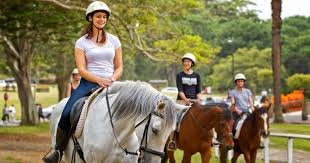
Horse Riding Lessons
Horse riding is an ancient and rewarding sport that combines physical exercise, mental focus, and a unique bond with animals. Whether you are a complete beginner or looking to improve your skills, horse riding lessons provide structured guidance to learn the techniques, safety protocols, and horse care necessary to become a confident rider. This article covers everything from the benefits of horse riding lessons, different riding styles, gear, safety, challenges, and how to choose the right instructor.
Benefits of Taking Horse Riding Lessons
Horse riding lessons offer much more than just learning how to ride. They help build balance, coordination, strength, and flexibility. Regular riding improves your core muscles, posture, and cardiovascular health. Beyond physical benefits, horse riding also boosts mental well-being by reducing stress, improving focus, and building confidence. Lessons teach you how to understand horse behavior and develop a connection with the animal, which is essential for safety and enjoyment.
Different Styles of Horse Riding
There are various styles of horse riding, each with its own techniques and traditions. The two most popular are English riding and Western riding.
- English riding emphasizes formal riding techniques and is often seen in competitive disciplines like dressage, show jumping, and eventing. Riders use a smaller saddle and maintain a more upright posture.
- Western riding originated from the American West and is more relaxed, used for ranch work and trail riding. It features a larger saddle with a horn and often focuses on practical skills like cattle herding.
Choosing which style to pursue depends on your interests, goals, and the type of riding available near you.
What to Expect in Your First Horse Riding Lesson
Your first lesson will typically focus on safety and familiarizing you with the horse. You will learn how to approach and handle the horse, mount and dismount safely, and basic riding positions like the posting trot and walk. The instructor will teach you how to use reins and leg aids to control the horse’s movement. Expect a mix of ground exercises and riding to build comfort and confidence.
Essential Horse Riding Gear and Attire
Wearing the right gear is crucial for both safety and comfort. The most important equipment includes a riding helmet, which protects your head in case of falls. Proper riding boots with a small heel prevent your foot from slipping through the stirrup. Riding gloves improve grip on the reins and protect your hands. Comfortable, close-fitting pants like jodhpurs or breeches reduce chafing and allow free movement. Avoid loose clothing that could get caught.
Choosing the Right Riding School and Instructor
Selecting a reputable riding school with certified instructors is vital for safe learning. Look for schools accredited by recognized equestrian organizations such as the British Horse Society or the United States Pony Clubs. Experienced instructors not only teach riding skills but also horse care and safety. Reading reviews and seeking recommendations can help you find a trusted program.
Common Challenges for Beginners
Many beginners struggle with maintaining balance as the horse moves and understanding how to communicate effectively with the horse through subtle cues. Fear of falling or lack of confidence can also hinder progress. Horses can be unpredictable, and riders must learn to stay calm and responsive. Persistence, patience, and regular practice are key to overcoming these challenges.
Safety Tips During Horse Riding Lessons
Safety should always be the top priority. Always wear your helmet and appropriate gear. Listen carefully to your instructor’s advice and never take risks beyond your comfort level. Learn to recognize horse body language to anticipate behavior. Avoid sudden movements or loud noises that might startle the horse. In case of emergencies, know how to safely dismount or stop the horse.
Progressing to Intermediate and Advanced Riding
Once you master the basics, you can advance to more challenging skills such as jumping, dressage, cross-country riding, or competitive riding. Intermediate lessons often involve longer rides, varied terrain, and more precise control. Advanced riders develop a deeper bond with their horse and refine their techniques to excel in competitions or specialized disciplines.
Horse Care Basics Covered in Lessons
Most riding programs include instruction on horse grooming, feeding, and stable management. Understanding your horse’s health, signs of discomfort, and daily care is crucial for responsible riding. Caring for a horse builds respect and empathy, strengthening the rider-animal relationship.
Physical and Mental Health Benefits of Horse Riding
Riding is an excellent workout engaging multiple muscle groups and improving cardiovascular fitness. Mentally, it promotes focus, patience, and stress relief. Many therapists use equine-assisted therapy to help with emotional and psychological issues due to the calming effect horses have on humans.
Cost and Time Commitment for Horse Riding Lessons
Horse riding lessons can vary widely in cost depending on location, instructor, and lesson type. Group lessons tend to be less expensive than private sessions. Beginners should expect to commit to weekly lessons and practice to improve steadily. Additional costs may include gear, riding apparel, and possibly horse care if you own a horse.
How to Prepare for Your Horse Riding Lesson
Dress in comfortable clothes that allow freedom of movement. Wear your riding boots or sturdy closed-toe shoes. Bring water, and arrive early to acclimate to the stable environment. Be open-minded, ask questions, and be ready to listen and learn.
Final Thoughts
Horse riding is a rewarding pursuit that combines physical activity, mental focus, and a unique connection with horses. Taking professional horse riding lessons ensures that you learn safely and effectively, whether your goal is recreational riding, competition, or simply experiencing the joy of being with these majestic animals. With dedication, patience, and the right guidance, horse riding can become a lifelong passion.





